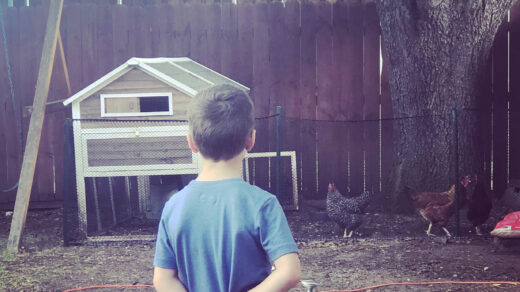This past January, I was at a conference in Miami, Fl. We took a bus one evening to dinner. I do NOT do buses well. And this particular “bus” was not actually a “bus” by my definition but instead one of those super large passenger vans. So, I sat up next to the driver and did my best to stare straight ahead – which of course meant that I did not get to engage with any of the conversations happening behind me. As we pulled out into the wild Miami traffic, I decided to try and talk to the driver. I hesitated for a moment, however, because I was pretty sure his primary language was Spanish. I speak a little Spanish, but I, for some reason, have this super anxiety about it. I worry about not finding the right words or tripping over them as I try to piece together a coherent sentence, and it often keeps me from communicating with people in Spanish regularly. This also means, however, that my language skills never get the necessary practice. Still, I took a deep breath and ventured a “How are you doing?” in English to test the waters. He indicated I needed to repeat myself, and I quickly realized he would be more comfortable if we spoke in Spanish. “¿Como estas?” I said shakily. “Ah, bien, bien. ¿Tu hablas español?” he responded with a grin. I struggled through my nerves to stammer out “Hablo un poquito. Necessito practicar pero estoy muy nerviosa.” (I speak a little. I need to practice but I’m very nervous.) He smiled shaking his head that it was alright. Then, we started a conversation.

I asked him lots of questions peppered with many “Como se dice?”s in between. We talked about his home country of Uruguay. We talked about the similarities and differences in the food in Uruguay and Miami and Texas. We spoke about the traffic, the prevalence of horn-use I had noticed in Miami, and compared the traffic rules in Uruguay and other South American countries with the traffic rules in the United States. And, as we approached our destination of the Gesu Church in Miami and later a restaurant in Little Havana, we spoke about the origins of those areas and their significance to Miami. My nerves dissipated over time, and I found it easier to try new words and speak in a less stilted way. I learned about his family and his love for his country of origin but also the love he had for the country he now resided in. I felt so incredibly gifted by this dialogue, but more than anything I felt gifted by the opportunity to listen to another’s personal story.
In life, I find, I often miss opportunities to listen to another person’s story firsthand. Maybe that is something we all do? Sometimes it is because I come to conclusions and make decisions about a situation before I have heard from the people it is directly affecting. I make assumptions and then am afraid to ask the necessary questions in order to verify or disprove those assumptions. After all, one of my first questions to him was “¿Eres de Mexico?” to which he responded, with no disapproval in his voice, that he was instead from Uruguay. Being open to asking questions and listening wholeheartedly to answers directly from the source, opens my mind and heart in a unique way.
Minds and hearts can even be changed when the interaction is not face-to-face (as many interactions are not in 2019). For example, lately I have been listening to the podcast Deliver Us from America Media. Maggi van Dorn has done an excellent job piecing together information and experiences in her podcast on the Catholic sex abuse scandal. After listening to victims speak directly about their experience on that show, I felt my heart both break and change. I have no idea what it feels like to be one of those victims, but taking a moment to enter into their story has helped frame how I approach what I read in the news and the responses I see from the Church. It has challenged me to ask questions, particularly when I read letters like Pope Benedict XVI’s most recent statement on the subject. Pope Benedict is known to be heady and academic while Pope Francis is more relational. So, reading the retired Pope’s words this last week left me wondering, has he met directly with the victims as Pope Francis has been trying to do? Has he heard their stories and walked with them through their various experiences? And if he had, would he have written the same statement?
Today is Palm Sunday, and the readings introduce us to a variety of emotions – starting with joy in the Gospel read as we enter the Church and changing to sorrow as we listen to the journey of Christ to the cross. As I was reflecting on these readings this week, I kept coming back to the idea that this is one story I do not get to hear firsthand from the one holding the wood of the cross. Sure, the Gospels are a rich and wonderful source of the Passion and death of Christ. And through study and comparison among all four Gospels, we can piece together an understanding of what happened. But there are still things missing in His journey that we will never know for sure – like the time He must have spent in prison between his arrest and his final walk to Calvary. I can not turn on a podcast, read a memoir, or sit next to Jesus in a bus ride through the streets of Miami and hear His story directly from Him.
Or can I? One of the ways of prayer in Ignatian Spirituality is Ignatian Contemplation. This form of prayer invites us to try and experience the sites, sounds, tastes, feels of the Gospels. It invites us to walk alongside Jesus on the way to Calvary in our imagination, and see what placing ourselves in that journey with Him reveals. What role would we play at the Last Supper? Where would we stand as Jesus walked the road to Calvary? What would we hear, see, smell, as he agonized in the Garden asking God to please take this cup from Him? Every year, we walk through the Passion twice – once on Palm Sunday and again on Good Friday. The longest Gospel days of the year, some might say with angst. (I know I have). But when I truly take the moment to close my eyes and listen to the voices recount the road to Jesus’ passion and death, I discover new fruits. I learn new things.
Ignatian contemplation, for me, causes some anxiety. I feel the same trepidation as I do when I struggle to open my mouth and speak another person’s language. I wonder if I’ll be able to do it. I wonder if anything I say or do in that imaginative exercise will make sense. And I wonder if what I hear Jesus say really comes from Him or is just a product of my jumbled up interpretation trying to convert one language into another. But when I let go of that anxiety, when I actually try and lean into the experience, I remember what beauty and understanding comes from walking the challenging road alongside another. Particularly when that other person is Christ.
May you have the opportunity this Holy Week to take time to walk alongside Christ, feel the dust upon your feet and the heat of the sun on your neck, hear the sounds of the crowd echoing in your ears, feel the blood and sweat and tears upon His face, and most of all experience deep within you the love Jesus had for you fill your heart.


